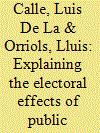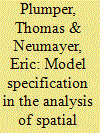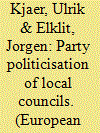|
|
|
Sort Order |
|
|
|
Items / Page
|
|
|
|
|
|
|
| Srl | Item |
| 1 |
ID:
094979


|
|
|
|
|
| Publication |
2010.
|
| Summary/Abstract |
This article analyses the extent to which national policies in the highly internationalised environmental sector are influenced by the policy preferences of political parties. The focus is on policy outputs rather than environmental performance as the central indicator of policy change. Based on a discussion of the relevant theoretical literature competing hypotheses are presented. For an empirical test, a dataset is used that includes information on the number of environmental policies adopted in 18 OECD countries at four points in time between 1970 and 2000. The results show that not only international integration, economic development and problem pressure, but also aspects of party politics, influence the number of policies adopted. The number of environmental measures increases if the governmental parties adopt more pro-environmentalist policy positions. This effect remains robust even when controlling for the institutional strength of governments, the left-right position of parties in government, the inclusion of an ecological or left-libertarian party inside the (coalition) government, and the presence of a portfolio that deals exclusively with environmental issues.
|
|
|
|
|
|
|
|
|
|
|
|
|
|
|
|
| 2 |
ID:
094982


|
|
|
|
|
| Publication |
2010.
|
| Summary/Abstract |
According to the literature, governments have strong incentives to use the public budget tactically in order to either obtain the electoral support of new voters or strengthen the loyalty of their traditional supporters. Yet vote-seeking strategies only become rational when voters follow their self-interest and reward governments when their constituency benefits from public transfers. The literature has focused on the governments' incentives, largely ignoring the importance of knowing whether the electorate is responsive to public investments. This study tests empirically whether incumbents strategically use public investments to gather more electoral support; and whether voters take these investments into account at the polls. These two questions are pursued simultaneously by using as a case study the expansion of the underground network in Madrid, Spain. Only a little evidence is found to support the idea that regional governments constructed new metro stations in neighbourhoods where they had more to gain electorally. Also, the inauguration timing strictly followed the electoral cycle, something that indicates a strategic calculus on the part of the incumbent. However, the models are also consistent with the idea that the government's investments were primarily driven by motives of efficiency. Indeed, although governments are tempted to follow vote-seeking strategies, they are also aware that they cannot deviate too much from an efficiency-based allocation of public resources. From the perspective of the voters, robust evidence has been found to show that regional voters rewarded this policy at the neighbourhood level. Neighbourhoods that received new metro stations voted in higher numbers for the incumbent than those quarters without new investments. All in all, these findings may have some implications for normative democratic theory.
|
|
|
|
|
|
|
|
|
|
|
|
|
|
|
|
| 3 |
ID:
094983


|
|
|
|
|
| Publication |
2010.
|
| Summary/Abstract |
The recent surge in studies analysing spatial dependence in political science has gone hand-in-hand with increased attention paid to the choice of estimation technique. In comparison, specification choice has been relatively neglected, even though it leads to equally, if not more, serious inference problems. In this article four specification issues are analysed. It is argued that to avoid biased estimates of the spatial effects, researchers need to consider carefully how to model temporal dynamics, common trends and common shocks, as well as how to account for spatial clustering and unobserved spatial heterogeneity. The remaining two specification issues relate to the weighting matrix employed for the creation of spatial effects: whether it should be row-standardised and what functional form to choose for this matrix. The importance of these specification issues is demonstrated by replicating Hays' model of spatial dependence in international capital tax rate competition. Seemingly small changes to model specification have major impacts on the spatial effect estimates. It is recommended that spatial analysts develop their theories of spatial dependencies further to provide more guidance on the specification of the estimation model. In the absence of sufficiently developed theories, the robustness of results to specification changes needs to be demonstrated.
|
|
|
|
|
|
|
|
|
|
|
|
|
|
|
|
| 4 |
ID:
094980


|
|
|
|
|
| Publication |
2010.
|
| Summary/Abstract |
Local government party systems are not necessarily copies of the national party system. In many countries, local party systems have come to resemble the national one more and more - a process Rokkan termed 'party politicisation'. The traditional expectation has been that the take-over of local politics by political parties, through a gradual process of societal modernisation, would eventually be complete. More recently, however, it has been suggested that reorganisations of the institutional set-up - that is, amalgamations of municipalities - could entail developments in the degree of local party system nationalisation. This article investigates cultural and institutional explanations for party politicisation by analysing the Danish case from 1966 to 2005 - a period that witnessed both major amalgamation reforms and periods of stability in the local government structure. The data suggest that dramatic party politicisation does not lend itself to cultural explanations, but originates exclusively from changes in the institutional set-up. Party politicisation is not a gradual process, but comes - at least in Denmark - in leaps coinciding with major reorganisations of the local government structure.
|
|
|
|
|
|
|
|
|
|
|
|
|
|
|
|
| 5 |
ID:
094981


|
|
|
|
|
|
|
|